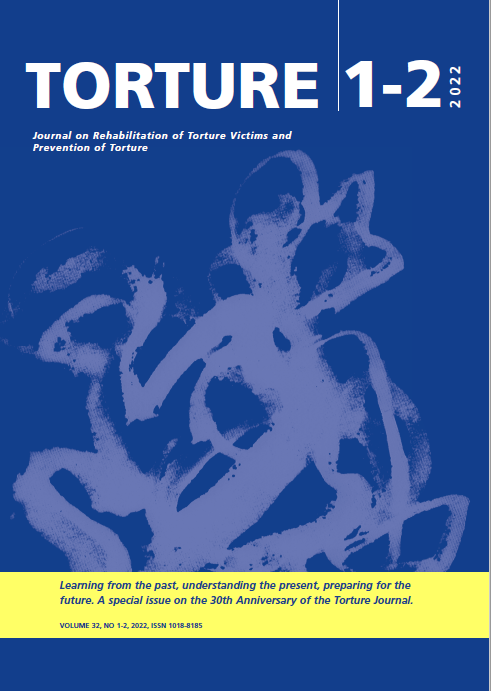Torture, that recurring nightmare. Social crisis and pandemic
DOI:
https://doi.org/10.7146/torture.v32i1-2.129414Palabras clave:
Torture, Neoliberalism, social crisis, covid-19, necropoliticsResumen
This article addresses the summative effects of the social crisis and the Covid-19 pandemic on the health-disease-care process at the level of Chilean society in the neoliberal context. The economy-health relationship is deepened, a phenomenon that is interpreted from the conceptual framework of necropolitics. The retraumatizing effect of the human rights violations recorded during the popular mobilizations of the social revolt of October 2019 in Chile, including the practice of torture, is reviewed.
Citas
Breilh, J. (2013). The social determination of health as a tool for transformation towards a new public health (collective health). Rev. National Faculty of Public Health U. of Antioquia, 13-27.
Grez, S. (2007). From the "regeneration of the people" to the general strike. Génesis y evolución histórica del movimiento popular en Chile (1810-1890). Santiago de Chile: RIL Editores.
Han, B-C. (2016). La sociedad del cansancio. Barcelona: Herder.
Klein, N. (2014). The shock doctrine. The rise of disaster capitalism. Spain: Espasa libros.
Lazzarato, M. (2013). The factory of the indebted man. Ensayo sobfre la condición neoliberal. Buenos Aires: Amorrortu.
Lazzarato, M. (2020). Capital hates everyone. Fascism or revolution. Buenos Aires: Eterna cadencia Editora.
Manns, P. (2001). Chile: una dictadura militar permanente (1811-1999). Santiago de Chile: Sudamericana.
Mbembe, A. (2020). Pandemic democratizes the power to kill. https://lavoragine.net/la-pandemia-democratiza-poder-de-matar/
Salazar, G. (2006). La violencia política popular en "las grandes alamedas". La vioencia en Chile 1947-1987 (una perspectiva histórico-popular). Santiago de Chile: LOM.
Valencia, S. (2010). Capitalismo Gore. Spain: Melusina.

Descargas
Publicado
Cómo citar
Número
Sección
Licencia
Derechos de autor 2022 Torture Journal

Esta obra está bajo una licencia internacional Creative Commons Atribución-NoComercial-SinDerivadas 4.0.
We accept that some authors (e.g. government employees in some countries) are unable to transfer copyright. The Creative Commons Licence Attribution-NonCommercial-NoDerivatives 4.0 International (CC BY-NC-ND 4.0) covers both the Torture Journal and the IRCT web site. The publisher will not put any limitation on the personal freedom of the author to use material contained in the paper in other works which may be published, provided that acknowledgement is made to the original place of publication.

